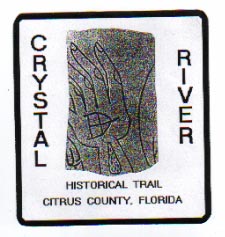
Instructions:
1....Print this file.
2....At its end, click on "rules" to see a copy of the trail rules, print it, and then click where indicated at the end of the 3-page rules and patch order form to get back to the list of Florida trails.
3....If you want a hand-drawn map showing the locations of all of the sites, send a self-addressed stamped envelope to Steve Rajtar, 1614 Bimini Dr., Orlando, FL 32806.
4....Hike the trail and order whatever patches you like (optional).
WARNING - This trail may pass through one or more neighborhoods which, although full of history, may now be unsafe for individuals on foot, or which may make you feel unsafe there. Hikers have been approached by individuals who have asked for handouts or who have inquired (not always in a friendly manner) why the hikers are in their neighborhood. Drugs and other inappropriate items have been found by hikers in some neighborhoods. It is suggested that you drive the hike routes first to see if you will feel comfortable walking them and, if you don't think it's a good place for you walk, you might want to consider (1) traveling with a large group, (2) doing the route on bicycles, or (3) choosing another hike route. The degree of comfort will vary with the individual and with the time and season of the hike, so you need to make the determination using your best judgment. If you hike the trail, you accept all risks involved.
In 1861, there were only two houses in the entire settlement, those of John E. Allen and Easley Allen. The next nearest home was that of James Miller, who lived one mile to the northwest of the river.
This is the first masonry building constructed in Crystal River, dating to 1920.
Now a museum, this field stone building was constructed in 1939.
Crystal Masonic Lodge 156 reorganized on May 12, 1943, through the efforts of Rev. E.A. Sanders. This building was constructed by W.M. Nixon, and has also housed The House of God church.
This congregation was organized on October 4, 1884, by Rev. Washington Thomas and Morris Mobley. The sanctuary was rebuilt in 1946.
There are several legible headstones from the 1880s, with the earliest probably being that of William Noyes Bonett, who died in 1878.
The first Crystal River post office was established in 1857 with John E. Turkett as the first postmaster. It was located about five miles from town, but was moved into Crystal River after the Civil War. It was located in a two-story building near this site. The present post office was built here in 1961.
This bank received its charter in 1953 with George H. Brannen, Sr. as its first president. It later moved into a remodeled building here.
This school was built in 1924 with plans prepared by architect T.M. Bryan. It was restored in 1993 by J.P. Christoff & Associates, architects.
This congregation organized in late 1904, and Rev. F.C. Edwards served as its first pastor. The first church organized in Crystal River was also a Baptist church, known as the Churchhouse Hammock Baptist Church, located on what is now US 19.
This church was founded in 1893, and a part-time minister was hired for $150 per year. A sanctuary was built here in 1908.
A portion of this area was used by early natives as a religious and civic center. It shows habitation in the Swift Creek, Woodland Weeden Island, and Mississippian Safety Harbor periods, covering from 200 B.C. until 1400 A.D.
The two large truncated mounds, one conical burial mound, one small oval-shaped mound, and a large irregular-shaped ridge are formed by oyster shells. The burial mound was first excavated in 1903 by Clarence Moore, who found mica sheets, shell and stone objects, and copper ornaments. The presence of two inscribed ceremonial stones associated with the solar calendar is considered by some archaeologists as evidence of a connection with peoples of the Yucatan Peninsula.
This site was placed on the National Register of Historic Places on September 29, 1970.
A Guide to National Register Sites in Florida, (Florida Department of State 1984)
Back Home: A History of Citrus County, Florida, by Hampton Dunn (Citrus County Historical Society, Inc. 1989)
Florida's History Through Its Places: Properties in the National Register of Historic Places, by Morton D. Winsberg (Florida State University 1988)
Guide to Florida's Historic Architecture, (University of Florida Press 1989)
Indian Mounds of the Atlantic Coast: A Guide to Sites from Maine to Florida, by Jerry N. McDonald and Susan L. Woodward (The McDonald & Woodward Publishing Company 1987)